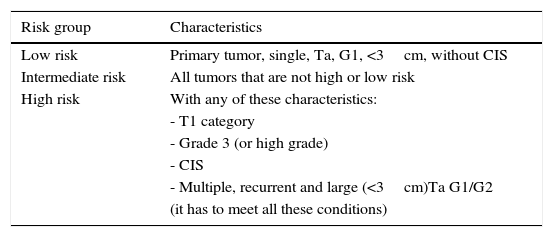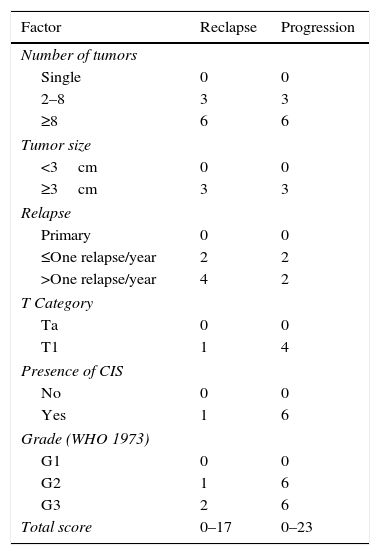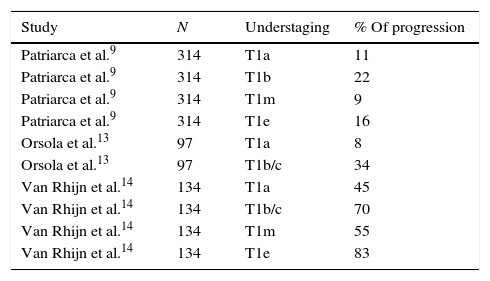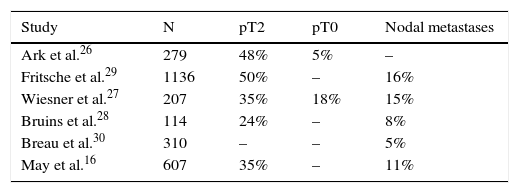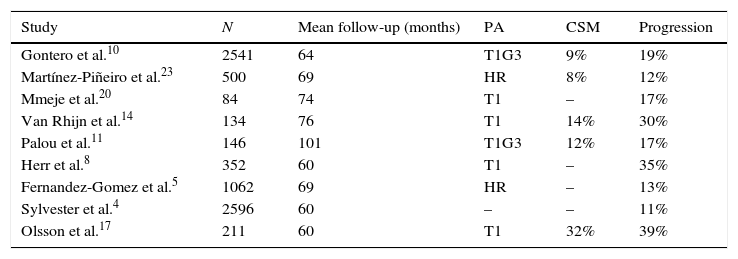High-risk nonmuscle-invasive bladder cancer is a disease that includes a heterogeneous group of patients, for whom close follow-up is recommended due to the risk of progression to a muscle-invasive tumor. The treatment of choice for these tumors is transurethral resection of the bladder tumor followed by a program of bacillus Calmette-Guerin instillations. There is a subgroup of patients who have a greater risk of progression and who benefit from early radical treatment.
ObjectiveTo identify which patient group with nonmuscle-invasive bladder cancer will benefit from early radical treatment.
Searching the evidenceWe performed a literature review to identify the risk factors for progression for these patients and thereby recommend a treatment that improves their survival rate.
Synthesis of the evidenceWe identified the various prognostic factors associated with tumor progression: the persistence of T1 tumor in re-resection of the bladder tumor, the presence of carcinoma in situ, patients refractory to bacillus Calmette-Guerin treatment, patients older than 70 years, tumors larger than 3cm, the substaging of T1 tumors, the presence of lymphovascular invasion and the presence of a tumor in the prostatic urethra. Similarly, we comment on the advantages of radical versus conservative treatment, considering that the performance of an early cystectomy due to a high-risk noninvasive vesical tumor has a better cancer prognosis than those in which the operation is deferred until the progression.
ConclusionsIn this disease, it is important to individualize the patients to provide them personalized treatment. For patients with the previously mentioned characteristics, it is recommended that early cystectomy not be delayed.
El cáncer vesical no músculo infiltrante de alto riesgo es una enfermedad que integra un grupo heterogéneo de pacientes, en los que se recomienda un seguimiento estrecho debido al riesgo de progresión a tumor músculo infiltrante. El tratamiento de elección de estos tumores es la resección transuretral de vejiga seguido de un programa de instilaciones con BCG. Existe un subgrupo de pacientes que tiene un mayor riesgo de progresión, y que se benefician de un tratamiento radical de inicio.
ObjetivoIdentificar qué grupo de pacientes con cáncer vesical no músculo infiltrante se benefician de un tratamiento radical precoz.
Búsqueda de la evidenciaSe realizó una revisión bibliográfica para identificar los factores de riesgo de progresión de estos pacientes, y así poder recomendar un tratamiento que mejore su tasa de supervivencia.
Síntesis de la evidenciaSe identificaron los diferentes factores pronósticos asociados a progresión tumoral: la persistencia de tumor T1 en la re-resección transuretral de vejiga, la presencia de carcinoma in situ, refractariedad al tratamiento con BCG, los mayores de 70 años, los tumores mayores 3cm, la subestadificación de los tumores T1, la presencia de invasión linfovascular y la presencia de tumor en la uretra prostática. Igualmente se comentan las ventajas del tratamiento radical frente al conservador, apreciando que la realización de una cistectomía precoz por un tumor vesical no infiltrante de alto riesgo tiene un mejor pronóstico oncológico en comparación con aquellos en los cuales se difiere la realización de la misma hasta la progresión.
ConclusionesEn esta enfermedad es importante individualizar a los pacientes, para así ofrecerles un tratamiento personalizado. En pacientes con las características mencionadas previamente se recomienda no demorar la cistectomía precoz.






